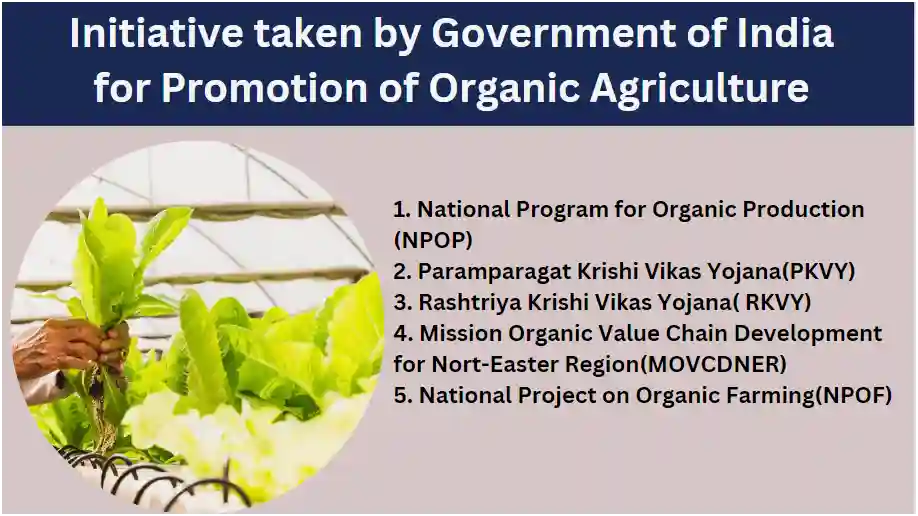In recent years, organic agriculture has gained significant attention due to its sustainable and eco-friendly practices. In India, the government, NGOs, and other organizations have taken various initiatives to encourage and support organic farming.
These efforts aim to promote organic agriculture as a viable and environmentally friendly option for farmers.
Promotion of Organic Agriculture by Government of India is:
The Government of India has taken several initiatives to promotes organic agriculture in the country. These include:
1. National Program for Organic Production (NPOP):
NPOP was launched in 8 may 2000, It has been working for accredit and certification programs since oct, 2001.
The NPOP was launched by the government to regulate organic farming practices and provides certification.
It establishes standards for organic production, accredits bodies, and promotes organic farming through various schemes.
2. Paramparagat Krishi Vikas Yojana(PKVY):
This schemes was launched in 2015 to promotes traditional and sustainable agricultural practices, including organic farming.
The schemes provides financial assistance to farmers for adopting organic farming practices, setting up organic processing units and the implementation of organic techniques.
Paramparagat Krishi Vikas Yojana(PKVY) scheme is a cluster-based program for the production of organic farming.
3. Rashtriya Krishi Vikas Yojana( RKVY):
Rashtriya Krishi Vikas Yojana supports organic farming by providing financial assistance to farmers.
The funds can be used for adopting organic practices, setting up organic input production units, and establishing organic markets.
It is launched in august 2007 by the Indian government, to promote the use of organic farming practices and reduce dependence on a chemical agricultural input.
4. Mission Organic Value Chain Development for Nort-Easter Region(MOVCDNER):
Mission Organic Value Chain Development for Nort-Easter Region(MOVCDNER) initiatives focuses on promoting organic farming in the northern states of India.
It includes capacity building, certification support, market linkage, value addition, storage, processing, and infrastructure development for organic farming.
5. National Project on Organic Farming(NPOF):
This is one of the government schemes for organic farming in India, under the NPOF scheme.
The government has been advocating integrating the use of organic manures including biofertilizer for increasing the production of organic crops.
It helps in financial support for setting up of organic input production unit, biofertilizer and biopesticides.
6. National Mission on Oilseeds and Oil Palm(NMOOP):
The organic farming policy aims to promote the production of edible oils and increase oil palm plantations.
Under this mission financial assistance at 50% subsidy is provided for some components like bio-fertilizer and vermicomposting.
7. Capital Investment Subsidy Scheme(CISS):
To promote organic farming by making available the organic inputs such as biofertilizer, biopesticides, fruits, and vegetables market.
To reduces the total dependent on chemical fertilizer and pesticides to increase agricultural productivity by maintaining soil health.
8. National Horticulture Mission(NHM):
The government gives to training farmers under this schemes. Organic farmers are also distributed land for farming which is apart of economic organic farming.
9. One District One Product(ODOP):
The Indian government has introduced the One District One Product (ODOP) initiative as a transformative policy to promote balanced regional development and stimulate local economies.
This program focuses on identifying, promoting, and branding a unique product from each district, aiming to make districts more competitive in national and international markets.
This program supports the production and marketing of organic products, aligning with India’s broader goal of sustainable agriculture.
10. Zero Budget Natural Farming (ZBNF):
The Indian government has recognized the potential of ZBNF in promoting sustainable agriculture, organic farming and improving farmers’ livelihoods.
Zero Budget Natural Farming (ZBNF) is a holistic agricultural approach that promotes organic agriculture without relying on external chemical inputs.
Pioneered by Indian agriculturist Subhash Palekar, ZBNF aims to reduce farmers’ dependence on costly agricultural inputs, thereby ensuring sustainable and cost-effective farming.
11. Agri Export Policy(AEP):
The Agri Export Policy (AEP) was introduced by the Government of India in 2018 to boost organic agricultural exports, ensure better remuneration for farmers, and promote India’s agricultural products in the global market.
12. National Centre for Organic Farming(NCOF):
The National Centre for Organic Farming (NCOF) is a premier institution under the Ministry of Agriculture and Farmers’ Welfare, Government of India.
Established with the objective of promoting organic farming in the country, NCOF plays a important role in research, training, and extension activities related to organic agriculture.
The NCOF aims to enhance soil health, reduce dependency on chemical inputs, and promote sustainable agricultural practices.
Conclusion:
These are many initiatives taken by the government of India to promote organic farming. This initiative helps farmers produce and market organic products around the globe without any disturbance.
Read More:

